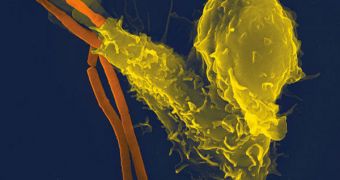A team of investigators may have just found a way of preventing the immune system from providing exaggerated reactions in a host of situations. The findings could help save numerous lives.
The dysfunctional immune response that the investigators wanted to address is responsible for a host of extremely severe events, such as for example promoting the rejection of transplant organs, or the destruction of joints in people who are suffering from rheumatoid arthritis.
Additionally, it can also provoke delayed death in heart attack patients, and deadly hemorrhagic shock, say researchers at the Eastern Virginia Medical School and the Children's Hospital of The King's Daughters.
The team of experts from these two institutions managed to identify a small molecule that can prevent this immune response from taking place. But the real good news is that the molecule can be made into a drug, e! Science News reports.
The fact that the modified peptide has such a direct and significant effect “puts us in a position to move rapidly from in-vitro testing to in-vivo testing,” explains Neel Krishna, PhD.
The expert is an assistant professor of microbiology and molecular cell biology at the EVMS, as well as a pediatric virologist at the CHKD.
Details of how the recently-found molecule acts, and the pathways it activates to shut down the erroneous immune system response, appear in a paper published in the latest issue of the esteemed scientific journal Molecular Immunology.
The team says that they managed to extract the peptide from the protein shell of a relatively common virus, that is responsible for causing diarrhea in small children.
“Being able to pharmacologically modulate the complement system could have a huge impact on the practice of medicine, potentially saving the lives of victims of hemorrhagic shock, heart attack patients, and even infants who have suffered prolonged hypoxia,” Dr. Krishna reveals.
“It could also have a significant impact on treating a wide range of autoimmune and inflammatory diseases,” the scientist says. The research effort has been ongoing for the past five years.
If new drugs are developed based on this peptide, then the rate of transplant success could increase considerably, healthcare experts say.
One of the main reasons transplants patients don't make it is that the immunosuppressive drugs they take do not allow for their immune system to be expressed fully, which means that numerous infections can set in.

 14 DAY TRIAL //
14 DAY TRIAL //